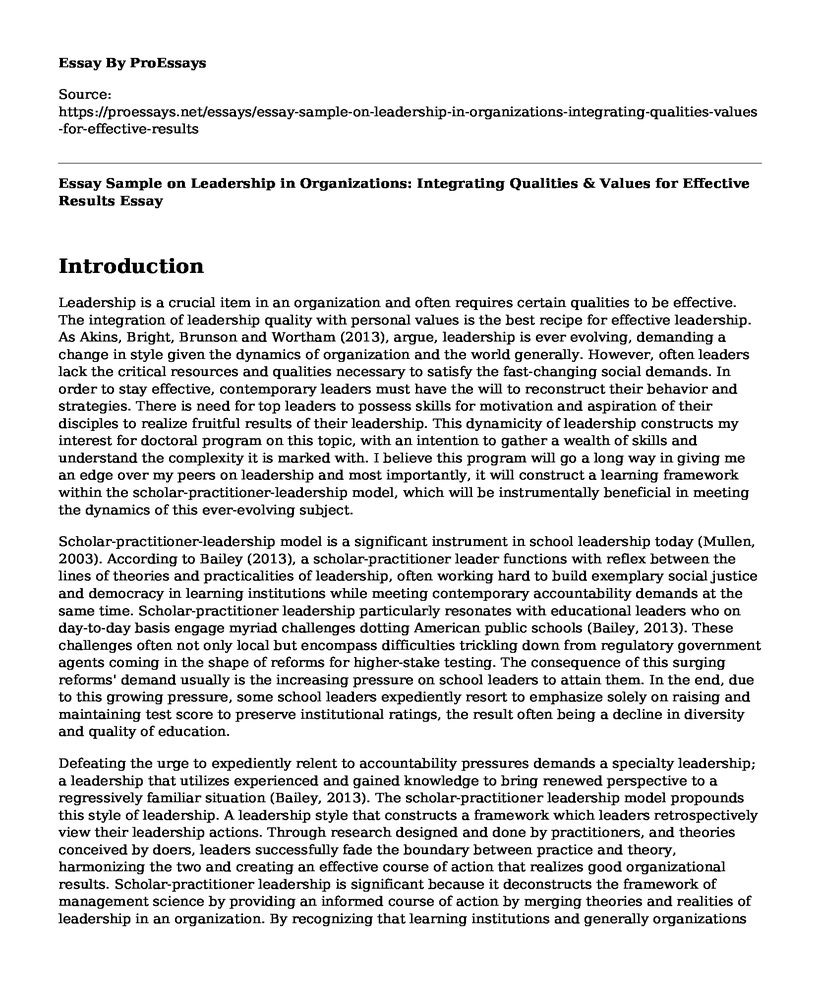Introduction
Leadership is a crucial item in an organization and often requires certain qualities to be effective. The integration of leadership quality with personal values is the best recipe for effective leadership. As Akins, Bright, Brunson and Wortham (2013), argue, leadership is ever evolving, demanding a change in style given the dynamics of organization and the world generally. However, often leaders lack the critical resources and qualities necessary to satisfy the fast-changing social demands. In order to stay effective, contemporary leaders must have the will to reconstruct their behavior and strategies. There is need for top leaders to possess skills for motivation and aspiration of their disciples to realize fruitful results of their leadership. This dynamicity of leadership constructs my interest for doctoral program on this topic, with an intention to gather a wealth of skills and understand the complexity it is marked with. I believe this program will go a long way in giving me an edge over my peers on leadership and most importantly, it will construct a learning framework within the scholar-practitioner-leadership model, which will be instrumentally beneficial in meeting the dynamics of this ever-evolving subject.
Scholar-practitioner-leadership model is a significant instrument in school leadership today (Mullen, 2003). According to Bailey (2013), a scholar-practitioner leader functions with reflex between the lines of theories and practicalities of leadership, often working hard to build exemplary social justice and democracy in learning institutions while meeting contemporary accountability demands at the same time. Scholar-practitioner leadership particularly resonates with educational leaders who on day-to-day basis engage myriad challenges dotting American public schools (Bailey, 2013). These challenges often not only local but encompass difficulties trickling down from regulatory government agents coming in the shape of reforms for higher-stake testing. The consequence of this surging reforms' demand usually is the increasing pressure on school leaders to attain them. In the end, due to this growing pressure, some school leaders expediently resort to emphasize solely on raising and maintaining test score to preserve institutional ratings, the result often being a decline in diversity and quality of education.
Defeating the urge to expediently relent to accountability pressures demands a specialty leadership; a leadership that utilizes experienced and gained knowledge to bring renewed perspective to a regressively familiar situation (Bailey, 2013). The scholar-practitioner leadership model propounds this style of leadership. A leadership style that constructs a framework which leaders retrospectively view their leadership actions. Through research designed and done by practitioners, and theories conceived by doers, leaders successfully fade the boundary between practice and theory, harmonizing the two and creating an effective course of action that realizes good organizational results. Scholar-practitioner leadership is significant because it deconstructs the framework of management science by providing an informed course of action by merging theories and realities of leadership in an organization. By recognizing that learning institutions and generally organizations are human constructions and not isolated entities, scholar-practitioner leadership deviates from presumed leadership style (2013). Rather, it offers practical and effectively reasonable style for leadership in an organization.
Conclusion
There are many dynamics in organizations bringing with it many challenges for leaders in the world today. For instance, cultural diversity management and the need to harmoniously integrate an organization's workforce in order to realize desired results is one of the biggest difficulties currently. I therefore believe by pursuing a doctorate program on leadership especially within the scholar-practitioner leadership model, I can gain an insight on managing such issues in an organization.
References
Akins, R., Bright, B., Brunson, T., & Wortham, W. (2013). Effective Leadership for Sustainable Development. E Journal of Organizational Learning & Leadership, 11(1).
Mullen, C. A. (2003). What is a scholar-practitioner. K-12 teachers and administratorsrespond. Scholar-Practitioner Quarterly, 1(4), 9-26.
Bailey, S. (2014). Scholar-Practitioner Leadership: A Conceptual Foundation. International Journal of Progressive Education, 10(3).
Cite this page
Essay Sample on Leadership in Organizations: Integrating Qualities & Values for Effective Results. (2023, Mar 27). Retrieved from https://proessays.net/essays/essay-sample-on-leadership-in-organizations-integrating-qualities-values-for-effective-results
If you are the original author of this essay and no longer wish to have it published on the ProEssays website, please click below to request its removal:
- Paper Example on Leadership in Organizations
- Adding Value in Hairdresser Business Essay
- Why Do Some Mergers and Acquisitions Fail? - Essay Sample
- Paper Example on Bad Decision Made, Good Lesson Learned
- Paper Example on Adapting to New Challenges: Balancing Family and Work
- Essay Example on The US Presidential Award: Unveiling the History of the Malcolm Baldrige National Quality Award
- Essay on Leadership and Responsibilities of Military Sergeants: Ensuring Operational Efficiency







